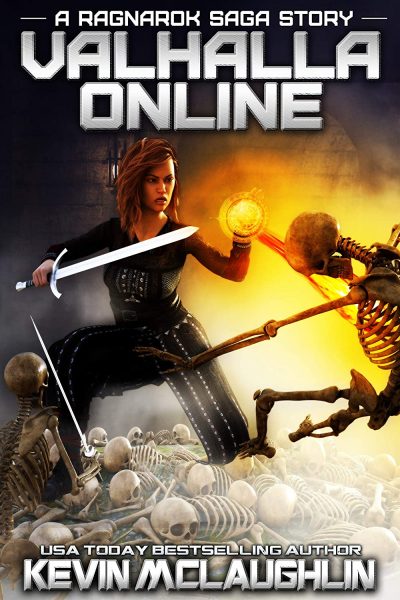Literary rating: ★★★
Kick-butt quotient: ☆☆☆☆
 I could have sworn this isn’t the first entry in the LitRPG genre I’d reviewed, but I’m damned if I can find the previous one. So, just to be safe, I’m going to explain what LitRPG is: apologies if this is unnecessary! Basically, it takes the structure of role-playing games (RPGs) – things like character levels, ability scores, etc – and applies them onto a story structure. Obviously, the overlap between RPGs and books has been a long one: Dungeons & Dragons is heavily influenced by the work of Tolkein. But it has been mostly one-way traffic. The LitRPG genre sends things back the other way, producing novels that adopt the practices of the games.
I could have sworn this isn’t the first entry in the LitRPG genre I’d reviewed, but I’m damned if I can find the previous one. So, just to be safe, I’m going to explain what LitRPG is: apologies if this is unnecessary! Basically, it takes the structure of role-playing games (RPGs) – things like character levels, ability scores, etc – and applies them onto a story structure. Obviously, the overlap between RPGs and books has been a long one: Dungeons & Dragons is heavily influenced by the work of Tolkein. But it has been mostly one-way traffic. The LitRPG genre sends things back the other way, producing novels that adopt the practices of the games.
Quite how this is managed, is up to the author. Here, the heroine is Samantha, a military police officer who wakes to find herself part of Valhalla Online. This is a fantasy-based online RPG, which was intended to act as a virtual repository for the personalities of the deceased, granting them eternal life. Which comes as a shock to Sam, because she never signed up for this very expensive process. However, for good reason, the “virtual dead” are extremely limited in their ability to communicate with the outside world. Only those who complete the entire game are allowed to do so. This means Sam will first have to figure out how to rack up a high score, in order to begin finding out how she got here and what’s going on. Her army training might help. But even West Point didn’t prepare her for dealing with magic spells and storming castles.
It’s a quick and light read, one which contains few surprises at all. We don’t learn much about Sam’s life before Valhalla Online, and I’m not even sure we even discover what she looked like in the real world. All we’re told is that in-game, “Her hair seemed to be about the same color. Her skin tone looked familiar to her.” The cover tells you more than the entire novel. It would probably help to be loosely familiar with at least the concept of RPGs, though McLaughlin does a decent job of explaining the game mechanics, without getting bogged down in it.
The main issue is that death literally has no sting here. If Sam suffers a mortal wound, she just gets sent back to a set location. She may lose some of her equipment, and suffer a bit of psychic shock, but that’s about it, despite the author’s efforts to put over some mental trauma. It’s accurate enough as a computer game goes, but shows that what works there doesn’t necessarily transfer to other media. This lacking of a sense of mortality may partly be why Roger Ebert said in 2010 that computer games can never be art. But that aside, this keeps moving forward at a brisk pace, and for obvious reasons, the reader learns about Valhalla alongside Sam, which makes for a smoothly entertaining experience. It’s more or less standard hack and slash, though towards the end, she subverts things nicely by recruiting a pack of enemy kobolds (think: mini-orcs) to her side. Pretty sure that wasn’t in the tutorial…
The ending is little more than a save point, though it does come after a neat bit of loot sniping. Again, the lack of mortality applies as much to Sam’s enemies as to her; there’s little sense of triumph when the villain will simply re-spawn tomorrow. I finished the first volume having been pleasantly entertained, just not much more. I feel I probably don’t need to buy the remaining entries, because I suspect I can largely figure out how things are going to progress in them. There’s just not enough replay value to be found here.
Author: Kevin McLaughlin
Publisher: Amazon Digital Services, available through Amazon, both as a paperback and an e-book
1 of 4 in the Valhalla Online series.




